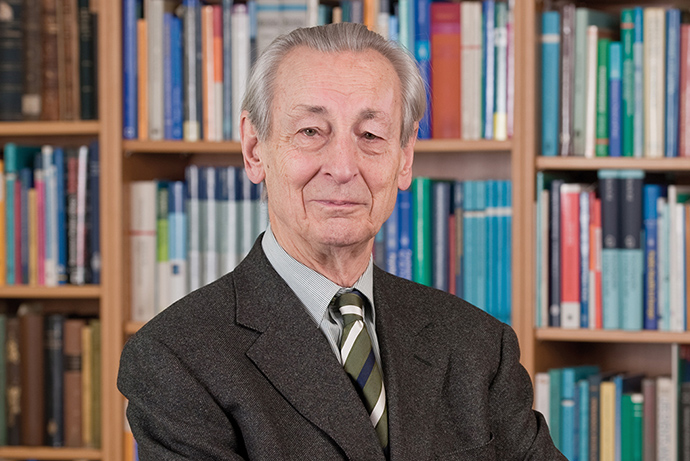Professor Dr. Dr. h.c. mult. Heinz Häfner, founder of the Central Institute of Mental Health and its first director from 1975 to 1994, died on May 30, 2022, at the age of 96 at his home in Heidelberg. With the CIMH, his vision of linking innovative community-based psychiatric health care, research and teaching became reality in 1975 after years of political paving the way.
Heinz Häfner was born in Munich on May 20, 1926, and studied medicine, psychology and philosophy there from 1944 to 1951. He graduated with a double doctorate in medicine and psychology. He began his medical training in internal medicine, which he followed with psychiatric and psychotherapeutic training in Tübingen under Professor Ernst Kretschmer. From 1954, neurology followed in Munich. As early as 1956, Häfner published his first book, "Schulderleben und Gewissen" (Perception of guilt and conscience).
In 1958, Heinz Häfner joined Professor Walter von Baeyer at the Psychiatric Clinic of the University of Heidelberg, where he habilitated in 1960 and became a senior physician. This was followed in 1964 by his appointment as an associate professor. In 1965 Häfner was appointed head of the newly created Department of Social Psychiatry and Rehabilitation at the Psychiatric Clinic of Heidelberg University. In the same year, he published the memorandum "Dringliche Reformen in der psychiatrischen Krankenversorgung der Bundesrepublik" (Urgent Reforms in Psychiatric Health Care in the Federal Republic). Co-authors were Walter von Baeyer and Karl Peter Kisker. Already here Heinz Häfner formulated his visionary thoughts for a restructuring of psychiatric care in Germany.
In 1967, he was appointed to the chair of psychiatry at the Faculty of Clinical Medicine Mannheim at the University of Heidelberg and headed the Social Psychiatric Clinic at the Mannheim Clinic. Very early on, he made efforts to reform psychiatry in post-war Germany and to humanize society's treatment of its mentally ill. From 1971 to 1975, for example, he was deputy chairman of the federal government's commission of experts on psychiatry (Psychiatrie-Enquete) and took on various tasks in the reform of psychiatry in Baden-Württemberg.
As early as 1963, he pursued concrete plans to establish a national psychiatric research institute. After he was able to win the city of Mannheim and especially the then mayor for social affairs and health, Dr. Hans Martini, as partners for planning and construction, the realization succeeded step by step, also thanks to financing by the state of Baden-Württemberg and the Volkswagenwerk Foundation. In 1975, the Central Institute for Mental Health was opened in J 5 in Mannheim.
In the 19 years of his leadership, Häfner built up the CIMH into a research institute of nationwide relevance, which soon grew into international top ranks. The CIMH became the center of a model community psychiatric care network in the middle of the city with exemplary complementary facilities. Under his leadership, the institute successfully attracted two special research areas from the German Research Foundation. During his tenure, staff members of the institute were appointed to a total of 23 chairs in Germany and Europe.
Heinz Häfner received several national and international awards, including the Federal Cross of Merit 1st Class in 1983, the Great University Medal of the University of Heidelberg in 1992, the Great Cross of Merit of the Order of Merit of the Federal Republic of Germany in 1994, the Leader of Psychiatry Award of the World Psychiatric Association in 1999, and the Griesinger Medal of the German Society for Psychiatry, Psychotherapy and Neurology (DGPPN) in 2013. In 2009, he was awarded the Dr. Hans Martini Medal for services to the Faculty of Clinical Medicine Mannheim at the University of Heidelberg. Häfner was also a member of the German Academy of Sciences Leopoldina and the Heidelberg Academy of Sciences, an honorary member of the American Psychopathological Association (APPA), the European Psychiatric Association (EPA), the DGPPN, and several national professional societies for psychiatry. Even after his retirement, Häfner was active as head of a research group at the CIMH, editor and contributor to national and international journals, and advised national and international research funding agencies as a reviewer.
His scientific work included more than 760 papers translated into numerous languages. He devoted a large part of his research life to the study of schizophrenia. Another focus was on research into the epidemiology of mental disorders. For example, he studied the distribution pattern of mental illness in the urban population of Mannheim, as well as the frequency, distribution, and causes of suicidal behavior in the population. In the last years of his scientific activity, he also dealt with historical aspects of psychiatry. For example, his monograph on Ludwig II of Bavaria, entitled "Ein König wird beseitigt" (A King Is Eliminated), published in 2008, received a great deal of public attention.
In 2011, together with Dr. Hans Martini, he wrote the book "Das Zentralinstitut für Seelische Gesundheit" (The Central Institute of Mental Health), which describes the exciting path from the phase of early plans to the establishment of the CIMH and beyond.
With Professor Heinz Häfner, German psychiatry loses a great reformer, clinician and researcher whose merits go far beyond scientific findings. His work and commitment have contributed significantly to modernizing psychiatric care in Germany and bringing it up to international standards. Equally important was his contribution to the destigmatization of mental illness in the public, for which he campaigned in numerous lectures until his last days.
Today, we regard the CIMH and the attitude out of which it was founded as the living legacy of Heinz Häfner, which we may gratefully continue to develop.
Our sympathy goes out to his family.


